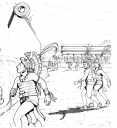Sports as Social Studies
|

|
|
Share This Page
|
|
|
|
|
|
|
Follow This Site

|
 |
|
|
|
|

|
Part
3: History and Cultures
- History: Every
sport has a history of some sort. Passionate fans
remember lots of their favorite sport's history. Baseball
especially has a long history, full of amazing feats and
a whole lot of numbers. Many people can remember the last
time the Dallas Cowboys won the Super Bowl (1996) a lot
better than they can when the Constitution came into
being (1781).
- Cultures:
Sports often reflect the culture of the countries in
which they are played. Countries like Kenya, with their
wide open spaces and their culture that emphasizes
walking and running, produce excellent long-distance
runners, moreso than any other country.
 Archaeology:
We can even find sports in archaeology. An example of
this is archaeological evidence of the ancient ball games
that the Mayas played in which they tried to throw a ball
through a ring. Sound familiar? We now call something
just like it basketball.
Archaeology:
We can even find sports in archaeology. An example of
this is archaeological evidence of the ancient ball games
that the Mayas played in which they tried to throw a ball
through a ring. Sound familiar? We now call something
just like it basketball.
In
many ways, sports define a society. They show what people
are interested in watching other people do and what they
will pay to see. They show how people can make a living by
being athletic and entertaining other people. They give
people ways to test their athletic skill against other
people. Most of all, they give people something to focus on
and follow that is a sort of release from the weighty cares
of everyday life.
First
page > The
Importance of Sports
> Page 1,
2,
3



 Archaeology:
We can even find sports in archaeology. An example of
this is archaeological evidence of the ancient ball games
that the Mayas played in which they tried to throw a ball
through a ring. Sound familiar? We now call something
just like it basketball.
Archaeology:
We can even find sports in archaeology. An example of
this is archaeological evidence of the ancient ball games
that the Mayas played in which they tried to throw a ball
through a ring. Sound familiar? We now call something
just like it basketball.
